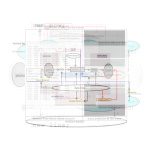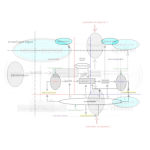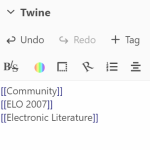Off Center Episode 17: Transgressive Games and Understanding Male Gamers with Kristine Jørgensen
Kristine Jørgensen, Scott Rettberg
This time around on the Off Center podcast, Scott Rettberg is joined by Kristine Jørgensen, professor of media studies and PI at the Center for Digital Narrative. They discuss male gaming culture and transgressive games, her involvement in the Games and Transgressive Aesthetics project, and as her ongoing project Understanding Male Gamers.
María Mencía’s e-Poetry: A Conversation Exploring Her Work
Yolanda De Gregorio Robledo, María Mencía
In this conversation with Yolanda De Gregorio Robledo, e-poet María Mencía discusses her journey as an artist and scholar. In doing so, María reveals her artistic interests, the influences the electronic literature community has had on her work, and the importance of highlighting women's contributions to the field of electronic literature as a whole.
Lost in The Backrooms [or How I Learned to Love the Liminal]
Mez Breeze
Experimental storyteller and digital artist Mez Breeze explores the liminal spaces of The Backrooms, a found footage web series which is based on a popular creepypasta of the same name. In doing so, Breeze confronts the feelings of alienation and predation inherent to late-stage capitalist society.
Off Center Episode 16: Alternate Reality Games with Patrick Jagoda
Patrick Jagoda, Scott Rettberg
Scott Rettberg talks to Patrick Jagoda—University of Chicago professor and cofounder of both the Game Changer Chicago Design Lab and the Transmedia Story Lab—about transmedia storytelling, alternate reality games, the differences in narrative design for video games and ARGs, and the role ARGs can have in a community.
Advertising with AI – On the presentation of authorship of ChatGPT-generated books
Tuuli Hongisto
Tuuli Hongisto explores the problems of cyborg authorship through the presentation of ChatGPT as a co-author of literary works on Amazon. Rather than shying away from admitting that an AI took part in the writing process, these authors position ChatGPT and other LLM's as authors with their own rights, rather than tools.
Call for contributions for special issue “Celebrating Joseph Tabbi and 30 Years of electronic book review”
electronic book review Editorial Team
A special call for papers celebrating the work of Joe Tabbi—electronic book review's founder and long-term editor-in-chief—which will be published in a special issue of electronic book review during the journal's 30th anniversary year.
ebr at the crossroads
electronic book review Editorial Team
The electronic book review Editorial Team discusses electronic book review's 30th anniversary, the journal's position at the junctures of multiple academic disciplines, the threat of an increasingly turbulent global stage, and the aspiration to continue providing a home for a future defined by resistance and unity.
Off Center Episode 15: Surveillance Microcosms with Mathias Klang
Mathias Klang, Scott Rettberg
Scott Rettberg and Mathias Klang discuss the panopticon of surveillance and our problematic relationship with the devices that make our lives easier — while also eroding our privacy.
Off Center Episode 14: Machine Vision with Jill Walker Rettberg
Scott Rettberg, Jill Walker Rettberg
Rettberg and Rettberg discuss Jill's new book on machine vision and, in doing so, cover the mythological origins of surveillance, cybersemniotics, and the role of fear in the technologization of Western society.
The Praxis of the Procedural Model in Digital Literature, Part 2: Applications
Philippe Bootz
Part 2 of Philippe Bootz's exploration of the procedural mode in digital literature, continued from part 1.
Off Center Episode 13: Creative AI with David Jhave Johnston
Scott Rettberg, David (Jhave) Johnston
Jhave and Scott Rettberg explore the bright side of AI, the revolutionary advancements in creativity and medicine, while trying not to be consumed by the crushing dark side, the "precarious potential for extinction."
The Praxis of the Procedural Model in Digital Literature, Part 1: Structural Aspects of the Model
Philippe Bootz
Phillipe Bootz defines and situates a set of artifacts, devices, material components and human groups that are in contact with earlier procedural "dispositifs." The procedural model, in Bootz's 30 year long research, analyses, theoretical frameworks and observations, expressly distinguishes human beings from material components. In opposition to artificial/human proposals such as the trans-human or the cyborg. The dispositif, in Bootz's presentation, only concerns the physical world. It does not contain signs, is not concerned with literature or art. And neither are individuals, within the procedural model, considered for themselves. They are actors at a given moment. Their positions are characterized by their power to directly act on the artifacts and objects of the dispositif.
A Review of Tactical Publishing
John-Wilhelm Flattun
Research-librarian John-Wilhelm Flattun reviews Tactical Publishing: Using Senses, Software, and Archives in the Twenty-First Century by Alessandro Ludovico. In the digital era of reading and writing — where new forms are constantly emerging old traditions wither away — how can we navigate the ever-changing landscape of publishing?
A Personal Twine Story
Chris Klimas
In a keynote delivered at ELO 2024, Chris Klimas recounts ELO 2007 and the creation of Twine. In doing so, he highlights the importance of community and open-source software in fostering digital creativity, while pondering the possibility of a platform dark forest.
Off Center Episode 12: Existential Transformative Game Design with Doris Rusch
Doris Rusch
In Off Center Episode 12, Scott Rettberg talks to game designer, academic, and author Doris Rusch about making games with meaning, existentialist psychotherapy, the resurgence of text-based games online, and embodiment: "Let’s talk about Zombie Yoga."